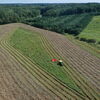Maine Harvest FCU grant program aims to boost farmland buys
A new program by the Maine Harvest Federal Credit Union will pay closing costs for farmland sales or refinancing, a move aimed at taking advantage of low interest rates and boosting the local food system.
The Conservation Grant Program will reimburse borrowers up to $3,500 per loan, allowing them to benefit from rates that have sparked growing interest in farmland purchases, the credit union said in a news release.
“Closing costs on farm loans are high, and often make it financially difficult to refinance, even at lower rates,” said Scott Budde, CEO and cofounder of the credit union. He said he hopes the grant program will incentivize farmers looking to buy land, expand acreage or reduce monthly mortgage costs.
“Our mission is to improve Maine’s local food system through responsible lending — ultimately strengthening the position of Maine’s hardworking small farms and food producers,” Budde said.
All farmers, both organic and nonorganic, interested in buying or refinancing farm land in Maine are encouraged to apply, credit union officials aid.
Interest rates are at historic lows because of uncertainty over the COVID-19 pandemic. Patty Duffy, the credit union's chief lending officer, said that there is increased interest in new farmland financing at the lower rates "which is a positive sign for the industry at-large,” she said.
To qualify for the program, borrowers will have to get the land analyzed by Maine Organic Farmers and Gardeners Association using software developed by the Natural Resources Conservation Service of the USDA. The software is designed to evaluate conservation practices that could be implemented to improve soil, water and environmental quality. Recommendations made during the assessments are only suggestions, the news release said — farmers do not need to act on them to qualify for the grant.
Increased interest in Maine farms
The credit union, with offices in Unity, was chartered last year by the National Credit Union Administration and opened in October. It's the first in the nation to focus on lending to small farmers and food producers, who sometimes have trouble getting financing from traditional lenders. The credit union's goal is to be a complement to a member's traditional bank or credit union.
"COVID-19 has brought increased attention to the importance of Maine’s farms, with many people actively seeking to purchase items produced locally,” said Amanda Beal, Maine commissioner of agriculture. “We hope that this positive trend continues post-pandemic, and that Maine farmers can find a way to take advantage of this loan program."
As of 2017, Maine had 7,600 farms that produce $3.8 billion in sales annually and employ 24,000 statewide, according to the U.S. Department of Agriculture five-year census. The agricultural sector is one of the largest bringing younger people to the state, with 40% of farmers age 34 or younger.
Food production, too, is on the rise in the state, one of the focuses of the credit union. Despite the rise in local food production and sales, those businesses have had trouble getting traditional financing because they aren't traditional farmers under USDA rules, and the credit union also focuses on that sector.
When it opened last year, Maine Harvest officials said expectations are the credit union will loan $12 million to 100 farmers and food producers in its first six years, financed by 1,000 members. Members must also be members of either MOFGA or the Maine Farmland Trust. Products will include equipment loans up to $45,000 and land mortgages up to $225,000.












0 Comments